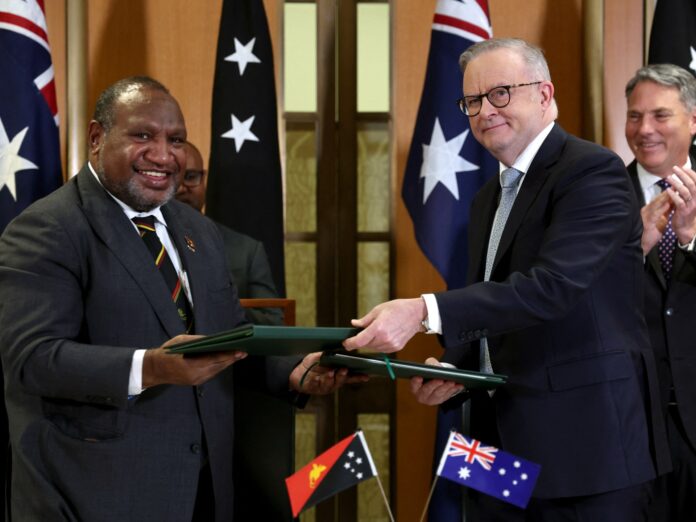Pukpuk treaty commits the two neighbours to greater military cooperation, although the text is yet to be released.
Published On 6 Oct 2025
Australia’s Prime Minister Anthony Albanese and the Prime Minister of Papua New Guinea (PNG) James Marape have signed a mutual defence treaty in Canberra, with the leaders saying the text of the agreement will be available soon.
Marape told reporters on Monday in the Australian capital that the treaty was drawn up “out of geography, history and the enduring reality of our shared neighbourhood”.
Recommended Stories
list of 4 itemsend of list
“It is about one bigger fence that secures two houses that has its own yard space,” Marape said, according to the Australian Broadcasting Corporation (ABC).
The Papua New Guinean leader disagreed that the pact was drawn up due to broader geopolitical issues, in an apparent reference to the military interests of countries like China and the United States in the Pacific region.
“This treaty was not conceived out of geopolitics or any other reason,” Marape said.
“We maintain friendships to all enemies, we advocate peace wherever we engage, in as far as foreign relations concern,” PNG’s leader added.
Australian Prime Minister Anthony Albanese said that the treaty “makes very explicit” that there will be “interoperability” between the two neighbouring countries’ “defence assets”, adding that “our greatest asset is our people”.
The ABC reported that this meant the two countries would share the same rights as current members of the Five Eyes agreement, which Australia shares with Canada, New Zealand, the United Kingdom and the US.
Marape’s office said last week that the agreement will create a path for 10,000 Papua New Guineans to serve in the Australian Defence Force, as his country also aims to build up its own defence force to 7,000 troops.
Papua New Guinea has a population of some 12 million people, of which about 40 percent live below the poverty line, in stark contrast to its richer neighbour, Australia.
The signing of the Pukpuk treaty comes weeks after Papua New Guinea celebrated 50 years of independence from Australia, which assumed control of its northern neighbour as a colonial power in 1902, after both countries were colonised by the UK.
In August 2013, Australia signed a memorandum of understanding with Papua New Guinea, which saw thousands of migrants arriving in Australia by boat detained on Manus Island in offshore detention.
The controversial detention centre closed in 2017, leaving hundreds of refugees stranded.
Australia is also seeking to sign a security agreement with Fiji, after a similar agreement covering both security and climate change with Vanuatu stalled last month.
Australia also recently signed a landmark treaty with Tuvalu, the world’s first agreement offering visas to help people facing displacement due to the climate crisis to resettle.
Climate change remains a key security concern for many countries in the region, with Australia bidding to host the 2026 UN COP climate change meeting, alongside its Pacific neighbours.
The bid has yet to materialise as Turkiye is also formally campaigning to host the same meeting.


